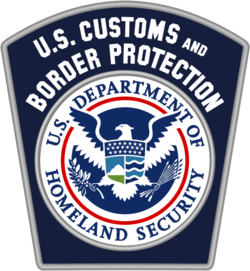Difference between revisions of "US/Customs and Border Protection"
m (Robin moved page US Customs and Border Protection to US/Customs and Border Protection) |
|||
| Line 11: | Line 11: | ||
The '''United States Customs and Border Protection''' is the largest federal law enforcement agency of the [[United States Department of Homeland Security]]. It is charged with regulating and facilitating international trade, collecting import duties, and enforcing U.S. regulations, including trade, customs, and immigration. | The '''United States Customs and Border Protection''' is the largest federal law enforcement agency of the [[United States Department of Homeland Security]]. It is charged with regulating and facilitating international trade, collecting import duties, and enforcing U.S. regulations, including trade, customs, and immigration. | ||
| − | ==Seizure of electronic devices== | + | ==Global Surveillance== |
| + | On March 11, the US Customs and Border Protection rolled out a new [[mass surveillance]] project at [[Washington DC]] airport, using computers to recognize people's faces in real time. This is reportedly only the first of at least three "Targeted Biometric Operations" experiments.<ref>http://motherboard.vice.com/read/us-customs-quietly-launches-facial-recognition-experiment-at-dc-airport</ref> | ||
| + | |||
| + | ===Seizure of electronic devices=== | ||
On entering USA, the CBP may seize electronic devices and send them off to a forensics lab for tests that could take weeks or months, and require that people who enter pay to get their devices returned, even if no wrong doing is found or alleged. While observing that "the vast majority of staff to be pleasant and competent", ''[[The Register]]'' advised would be visitors to the USA: "in short, don't bring any data or software into the country you don't want to surrender to border officials."<ref>https://www.theregister.co.uk/2017/02/14/reg_guide_to_data_security_when_entering_us/</ref> | On entering USA, the CBP may seize electronic devices and send them off to a forensics lab for tests that could take weeks or months, and require that people who enter pay to get their devices returned, even if no wrong doing is found or alleged. While observing that "the vast majority of staff to be pleasant and competent", ''[[The Register]]'' advised would be visitors to the USA: "in short, don't bring any data or software into the country you don't want to surrender to border officials."<ref>https://www.theregister.co.uk/2017/02/14/reg_guide_to_data_security_when_entering_us/</ref> | ||
| − | == | + | ===Retina Scanning on departure=== |
| − | + | By 2017, passengers departing the US were being retina scanned and images matched against their passports.<ref>https://professional-troublemaker.com/2017/02/27/dhs-quietly-testing-mandatory-facial-recognition-of-passengers-exiting-u-s/</ref> | |
| − | == | + | ==Corruption== |
| − | + | [[John Carman]] has testified about corruption within the CBP.<ref>https://www.malliard.com/john-carman/</ref> | |
{{SMWDocs}} | {{SMWDocs}} | ||
==References== | ==References== | ||
{{Reflist}} | {{Reflist}} | ||
Revision as of 17:07, 5 January 2019
 | |
| Abbreviation | CBP |
| Predecessor | • United States Department of Agriculture • United States Border Patrol • United States Customs Service |
| Headquarters | Ronald Reagan Building, Washington D.C. |
| Leader | U.S. Customs and Border Protection/Commissioner |
| Staff | 62,450 |
| Exposed by | John Carman, Sandy Nunn |
The United States Customs and Border Protection is the largest federal law enforcement agency of the United States Department of Homeland Security. It is charged with regulating and facilitating international trade, collecting import duties, and enforcing U.S. regulations, including trade, customs, and immigration.
Contents
Global Surveillance
On March 11, the US Customs and Border Protection rolled out a new mass surveillance project at Washington DC airport, using computers to recognize people's faces in real time. This is reportedly only the first of at least three "Targeted Biometric Operations" experiments.[1]
Seizure of electronic devices
On entering USA, the CBP may seize electronic devices and send them off to a forensics lab for tests that could take weeks or months, and require that people who enter pay to get their devices returned, even if no wrong doing is found or alleged. While observing that "the vast majority of staff to be pleasant and competent", The Register advised would be visitors to the USA: "in short, don't bring any data or software into the country you don't want to surrender to border officials."[2]
Retina Scanning on departure
By 2017, passengers departing the US were being retina scanned and images matched against their passports.[3]
Corruption
John Carman has testified about corruption within the CBP.[4]
References
- ↑ http://motherboard.vice.com/read/us-customs-quietly-launches-facial-recognition-experiment-at-dc-airport
- ↑ https://www.theregister.co.uk/2017/02/14/reg_guide_to_data_security_when_entering_us/
- ↑ https://professional-troublemaker.com/2017/02/27/dhs-quietly-testing-mandatory-facial-recognition-of-passengers-exiting-u-s/
- ↑ https://www.malliard.com/john-carman/